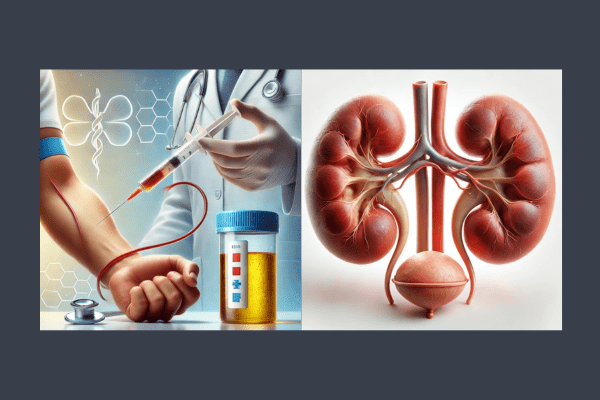World Kidney Day 2025: The kidneys are vital organs that produce important hormones, filter waste, maintain fluid balance, and control blood pressure. Kidney illnesses frequently develop covertly and only show symptoms later on, despite their vital roles. March 13, 2025, is designated as World Kidney Day, with the goal of raising awareness of kidney health and promoting preventative measures.
2025’s theme is “Are Your Kidneys OK? “Detect Early, Protect Kidney Health” and emphasizes how important early detection and timely action are. We may prevent kidney-related problems and protect our general health by being informed about kidney health, recognizing possible risks, and adopting healthy lifestyle choices.
Table of Contents
Understanding Kidney Function
The kidneys are two bean-shaped organs that are situated beneath the ribs on either side of the spine. Among their main duties are:
- Blood Filtration: Through urine, the kidneys eliminate waste, poisons, and extra fluid.
- Electrolyte balance: They control potassium, sodium, and other mineral levels.
- Blood Pressure Regulation: By regulating fluid levels and releasing renin, the kidneys regulate blood pressure.
- Erythropoietin, a hormone that promotes the synthesis of red blood cells, is produced by them.
- Bone Health: Vitamin D, which is necessary for calcium absorption, is activated by the kidneys.
Since the kidneys carry out these essential functions, any interference with their operation may have serious health repercussions.
Chronic Kidney Disease (CKD): A Global Health Challenge
Chronic Kidney Disease (CKD) is a condition characterized by the progressive decline of kidney function over time. It is often called a “silent disease” because symptoms usually appear in later stages. Without early detection and management, CKD can lead to kidney failure, requiring dialysis or a transplant.
Stages of CKD
CKD progresses through five stages:
- Stage 1: Normal kidney function with evidence of injury.
- Stage 2: There is a mild reduction in renal function.
- Stage 3: Moderate renal function loss.
- Stage 4: Severe decline in renal function.
- Stage 5 is kidney failure (end-stage renal disease).
At stage 5 of CKD, dialysis or a kidney transplant is necessary.
Risk Factors for CKD

Several factors increase the likelihood of developing CKD:
- Diabetes: High blood sugar levels damage kidney tissues over time.
- Hypertension (High Blood Pressure): Puts excessive pressure on the kidneys, leading to damage.
- Family History: Genetic predisposition can increase risk.
- Age: Kidney function declines with age, increasing susceptibility.
- Obesity: Excess body weight contributes to kidney strain.
- Smoking: Reduces blood flow to the kidneys, impairing function.
- Frequent Use of Painkillers: Overuse of NSAIDs like ibuprofen harms the kidneys.
World Kidney Day 2025: The Importance of Early Detection
Because CKD advances silently, early identification is critical. Detecting kidney illness in its early stages allows for prompt treatment and lifestyle adjustments, which slows development. Regular testing and awareness are critical in preventing CKD problems.
Common Symptoms of Kidney Disease
While early-stage CKD often has no symptoms, later stages may include:
- Fatigue and weakness.
- Swelling in legs, ankles, and feet.
- Changes in urine frequency or color.
- Persistent itching or dry skin.
- Shortness of breath.
- High blood pressure.
Screening and Diagnosis:
Regular kidney screenings help detect issues early. Common tests include:
- Blood Tests: Measure creatinine and estimated glomerular filtration rate (eGFR).
- Urine Tests: Check for protein, blood, or abnormalities.
- Imaging Tests: Ultrasounds and CT scans assess kidney structure.
- Biopsy: Examines kidney tissue for disease.
Preventive Measures for Kidney Health
Adopting a healthy lifestyle reduces the risk of CKD. Key preventive measures include:
- Managing Blood Sugar: Essential for diabetic individuals.
- Controlling Blood Pressure: Maintain levels below 130/80 mmHg.
- Maintaining a Healthy Weight: Prevents obesity-related complications.
- Following a Balanced Diet: Limit sodium, processed foods, and sugary drinks.
- Drinking Adequate Water: Helps flush toxins and prevent kidney stones.
- Avoiding Smoking and Alcohol: Protects blood vessels and kidney function.
- Regular Exercise: Improves overall health and circulation.
- Limiting NSAIDs and Painkillers: Reduces kidney strain.
Global Initiatives on World Kidney Day
World Kidney Day promotes kidney health worldwide through:
- Educational Seminars: Inform the public about kidney disease.
- Free Screening Camps: Provide kidney function tests.
- Fitness Challenges: Encourage healthy lifestyles.
- Social Media Campaigns: Spread awareness globally.
Organizations, governments, and healthcare providers work together to advocate for kidney disease prevention and treatment.
Role of Healthcare Professionals
Healthcare professionals play a crucial role in:
- Educating patients on kidney health.
- Encouraging routine screenings.
- Managing underlying conditions like diabetes and hypertension.
- Prescribing appropriate medications.
- Providing lifestyle recommendations.
Patient Stories: The Impact of Kidney Disease
Personal experiences highlight the challenges of living with CKD. Stories of patients emphasize the importance of early detection, lifestyle changes, and medical support. These narratives inspire others to prioritize kidney health and seek timely intervention.
Advancements in Kidney Disease Research
CKD diagnosis and therapy are being improved by ongoing research. Innovations include:
- New medications target illness progression.
- Gene Therapy: Investigates genetic alterations for treatment.
- Artificial Kidney Development: A Future Alternative to Dialysis.
- Improved Transplant Techniques: Increased Success Rates.
Ongoing studies seek to transform kidney care and improve patient outcomes.
Community Engagement for Kidney Health Communities can promote kidney health through:
- Hosting Awareness Programs: Educating people about prevention.
- Organizing Free Screenings: Early detection can save lives.
- Providing Resources: Supporting CKD sufferers.
- Encourage Healthy Habits: promoting lifestyle improvements.
Conclusion
World Renal Day 2025 highlights the vital role of kidney health in overall well-being. The kidneys are essential organs responsible for filtering waste, balancing bodily fluids, regulating blood pressure, and producing key hormones. However, Chronic Kidney Disease (CKD) remains a silent threat, often going undetected until its later stages.
Early detection through regular screenings is crucial in preventing kidney disease or managing it effectively. Simple tests such as blood and urine tests can help identify potential kidney issues before they become severe. In addition to medical checkups, adopting healthy habits plays a significant role in maintaining kidney function.
A balanced diet rich in seeds and millets( Foxtail, kodo, Brown Top) supports kidney health by providing essential nutrients, fiber, and antioxidants. These foods help regulate blood sugar levels, reduce inflammation, and lower the risk of kidney-related complications. Staying hydrated, maintaining a healthy weight, and managing conditions like diabetes and hypertension further contribute to kidney protection.
Addressing the growing burden of kidney disease requires collective action. Governments, healthcare providers, and citizens must work together to promote awareness, improve access to healthcare, and encourage preventive measures. By prioritizing kidney health today, we can help reduce the global impact of CKD and ensure a healthier future for all.

